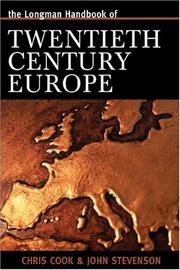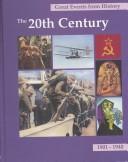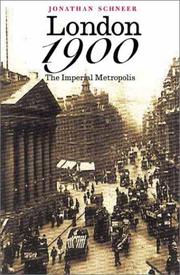| Listing 1 - 6 of 6 |
Sort by
|

ISBN: 1138142468 1315843560 1317892259 9781317892250 9781317892243 1317892240 9781315843568 0582235081 9780582235083 9781317892236 1317892232 9781138142466 Year: 2014 Publisher: Abingdon, Oxon : Routledge,
Abstract | Keywords | Export | Availability | Bookmark
 Loading...
Loading...Choose an application
- Reference Manager
- EndNote
- RefWorks (Direct export to RefWorks)
The twentieth century was one of constant upheaval across Europe. The continent saw wars, revolutions and the collapse of empires and a range of leading figures from Stolypin and Stalin to Chirac, Schroder and Putin. This book provides a detailed yet wide-ranging guide to the turbulent events of twentieth century Europe. Covering the whole period from Tsarist Russia and Imperial Germany to the Balkan Wars of the 1990's and the final birth of the Euro in 2002, it provides a convenient user-friendly compendium of key fact and figures for the whole of Europe - from the Atlantic to the Urals.
Twentieth century --- 1900s (Century) --- 20th century --- Nineteen hundreds (Century) --- Europe --- Council of Europe countries --- Eastern Hemisphere --- Eurasia --- History

ISBN: 9781587653247 9781587653254 9781587653261 9781587653278 9781587653285 9781587653292 9781587653308 128121776X 9786611217761 1587654458 9781587654459 9781281217769 1587653249 1587653257 1587653265 1587653273 1587653281 158765329X 1587653303 6611217762 Year: 2007 Volume: *7 Publisher: Pasadena, Calif. Salem Press
Abstract | Keywords | Export | Availability | Bookmark
 Loading...
Loading...Choose an application
- Reference Manager
- EndNote
- RefWorks (Direct export to RefWorks)
The 1,036 essays in this six-volume set cover the world's most important events and developments in the forty years that included World War I and led up to World War II, from 1901 through 1940. The period witnessed not only the Great War but also the Great Depression, the rise of the Nazi regime, the expansion of voting rights to women, and the flowering of African American literature and arts in the Harlem Renaissance. While the emphasis of the set is on political and military events, the range of subject matter is impressively diverse. Much emphasis is given to important events in the arts, sciences, business and human rights. The events are arranged chronologically. The text of each essay is divided into these sections: "Summary of Event", a chronological description of the facts of the event; "Significance", assessing the event's historical impact; "Further Reading", an annotated list of sources for further study; and "See also", cross-references to other essays within this Great Events set. Every essay includes an annotated, up-to-date bibliography and is illustrated and supplemented with sidebars that quote from key primary source documents
94 --- Middeleeuwen en Nieuwe/Nieuwste Tijd--in het algemeen --- 94 Middeleeuwen en Nieuwe/Nieuwste Tijd--in het algemeen --- Twentieth century --- 1900s (Century) --- 20th century --- Nineteen hundreds (Century) --- History - General --- History & Archaeology --- Twentieth century. --- HISTORY --- Modern. --- Modern
Book
ISBN: 0814749186 0814748422 9780814748428 9780814748169 0814748163 Year: 2010 Publisher: New York New York University Press
Abstract | Keywords | Export | Availability | Bookmark
 Loading...
Loading...Choose an application
- Reference Manager
- EndNote
- RefWorks (Direct export to RefWorks)
Since 1999 hundreds of thousands of young American Jews have visited Israel on an all-expense-paid 10-day pilgrimage-tour known as Birthright Israel. The most elaborate of the state-supported homeland tours that are cropping up all over the world, this tour seeks to foster in the American Jewish diaspora a lifelong sense of attachment to Israel based on ethnic and political solidarity. Over a half-billion dollars (and counting) has been spent cultivating this attachment, and despite 9/11 and the ongoing Israeli-Palestinian conflict the tours are still going strong.Based on over seven years of first-hand observation in modern day Israel, Shaul Kelner provides an on-the-ground look at this hotly debated and widely emulated use of tourism to forge transnational ties. We ride the bus, attend speeches with the Prime Minister, hang out in the hotel bar, and get a fresh feel for young American Jewish identity and contemporary Israel. We see how tourism's dynamism coupled with the vibrant human agency of the individual tourists inevitably complicate tour leaders' efforts to rein tourism in and bring it under control. By looking at the broader meaning of tourism, Kelner brings to light the contradictions inherent in the tours and the ways that people understandtheir relationship to place both materially and symbolically. Rich in detail, engagingly written, and sensitive to the complexities of modern travel and modern diaspora Jewishness, Tours that Bind offers a new way of thinking about tourism as a way through which people develop understandings of place, society, and self.
Tourism --- Heritage tourism --- Jews --- Travel --- Identity. --- 10-day. --- 1999. --- American. --- Based. --- Birthright. --- Israel. --- Jews. --- Kelner. --- Shaul. --- Since. --- all-expense-paid. --- effort. --- first-hand. --- forge. --- have. --- hundreds. --- known. --- look. --- modern. --- much-debated. --- much-emulated. --- observation. --- on-the-ground. --- over. --- pilgrimage-tour. --- provides. --- seven. --- this. --- thousands. --- ties. --- tourism. --- transnational. --- visited. --- years. --- young.

ISBN: 0585365962 9780585365961 0300076258 9780300076257 0300089031 9780300089035 Year: 1999 Publisher: New Haven : Yale University Press,
Abstract | Keywords | Export | Availability | Bookmark
 Loading...
Loading...Choose an application
- Reference Manager
- EndNote
- RefWorks (Direct export to RefWorks)
"London in 1900 was the greatest city on earth - the capital of an empire on which the sun never set. This book is the first to examine this powerful and influential city at the turn of the century and to invesitgate its relationship with Britain's far-flung empire."--Jacket.
Imperialism --- Public opinion --- Nineteen hundred, A.D. --- Nineteen hundred, A.D --- Great Britain --- Regions & Countries - Europe --- History & Archaeology --- Opinion, Public --- Perception, Public --- Popular opinion --- Public perception --- Public perceptions --- Judgment --- Social psychology --- Attitude (Psychology) --- Focus groups --- Reputation --- Colonialism --- Empires --- Expansion (United States politics) --- Neocolonialism --- Political science --- Anti-imperialist movements --- Caesarism --- Chauvinism and jingoism --- Militarism --- 1900 A.D. --- Year nineteen hundred, A.D. --- Nineteen hundreds (Decade) --- Nineteenth century --- History. --- History --- London (England) --- 1800-1950 --- England --- Nineteen hundred A.D.
Periodical
ISSN: 16478622 16453530
Abstract | Keywords | Export | Availability | Bookmark
 Loading...
Loading...Choose an application
- Reference Manager
- EndNote
- RefWorks (Direct export to RefWorks)
"É uma publicação temática, de periodicidade anual, com sistema de arbitragem científica que tem por finalidade dar a conhecer os resultados das investigações que se vão realizando sobre aspetos da sociedade contemporânea."--
Twentieth century --- Civilization --- Civilization. --- Twentieth century. --- 1900-1999 --- Portugal --- Portugal. --- 1900s (Century) --- 20th century --- Nineteen hundreds (Century) --- Barbarism --- Civilisation --- Auxiliary sciences of history --- Culture --- World Decade for Cultural Development, 1988-1997 --- al-Burtughāl --- al-Jumhūrīyah al-Burtughālīyah --- Burtughāl --- Jumhūrī-i Purtughāl --- Jumhūrīyah al-Burtughālīyah --- Portekiz --- Portekiz Cumhuriyeti --- Portogalia --- Portogallo --- Portugál Köztársaság --- Portugali --- Portugalia --- Portugalii͡ --- Portugalská republika --- Portugalʹskai͡a Respublika --- Portugalsko --- Portugiesische Republik --- Portuguese Republic --- Porutogaru --- Porutogaru Kyōwakoku --- P'orŭt'ugal --- P'orŭt'ugal Konghwaguk --- Purtughāl --- Putaoya --- Putaoya Gongheguo --- Repubblica Portoghese --- Republica Portughez --- República Portuguesa --- Republika Portugalska --- République portugaise --- Sefarad --- Lusitania (Portugal) --- Portugalii︠a︡ --- Portugalʹskai︠a︡ Respublika --- Republica Portugheză --- Португальская Республика --- Португалия --- פורטוגל --- البرتغال --- الجمهورية البرتغالية --- برتغال --- جمهوري پرتغال --- جمهورية البرتغالية --- پرتغال --- ポルトガル --- ポルトガル共和国 --- 葡萄牙 --- 葡萄牙共和国 --- 포르투갈 --- 포르투갈공화국 --- History, Modern --- History, Modern. --- Modern history --- World history, Modern --- World history
Book
ISBN: 128354816X 9786613860613 1400833043 0691154430 0691133336 9780691133331 9781400833047 9780691154435 9780691154435 Year: 2009 Publisher: Princeton Princeton university
Abstract | Keywords | Export | Availability | Bookmark
 Loading...
Loading...Choose an application
- Reference Manager
- EndNote
- RefWorks (Direct export to RefWorks)
The international controversy over who "owns" antiquities has pitted museums against archaeologists and source countries where ancient artifacts are found. In his book Who Owns Antiquity?, James Cuno argued that antiquities are the cultural property of humankind, not of the countries that lay exclusive claim to them. Now in Whose Culture?, Cuno assembles preeminent museum directors, curators, and scholars to explain for themselves what's at stake in this struggle--and why the museums' critics couldn't be more wrong. Source countries and archaeologists favor tough cultural property laws restricting the export of antiquities, have fought for the return of artifacts from museums worldwide, and claim the acquisition of undocumented antiquities encourages looting of archaeological sites. In Whose Culture?, leading figures from universities and museums in the United States and Britain argue that modern nation-states have at best a dubious connection with the ancient cultures they claim to represent, and that archaeology has been misused by nationalistic identity politics. They explain why exhibition is essential to responsible acquisitions, why our shared art heritage trumps nationalist agendas, why restrictive cultural property laws put antiquities at risk from unstable governments--and more. Defending the principles of art as the legacy of all humankind and museums as instruments of inquiry and tolerance, Whose Culture? brings reasoned argument to an issue that for too long has been distorted by politics and emotionalism. In addition to the editor, the contributors are Kwame Anthony Appiah, Sir John Boardman, Michael F. Brown, Derek Gillman, Neil MacGregor, John Henry Merryman, Philippe de Montebello, David I. Owen, and James C. Y. Watt.
Antiquities -- Collection and preservation -- Moral and ethical aspects. --- Antiquities -- Collection and preservation -- Social aspects. --- Cultural property -- Protection. --- Cultural property -- Repatriation. --- Excavations (Archaeology) -- Moral and ethical aspects. --- Museum exhibits -- Moral and ethical aspects. --- Museums -- Acquisitions -- Moral and ethical aspects. --- Museums -- Philosophy. --- Museums --- Museum exhibits --- Cultural property --- Antiquities --- Excavations (Archaeology) --- General --- Museum Publications --- Moral and ethical aspects --- Acquisitions --- Protection --- Repatriation --- Collection and preservation --- Social aspects --- Philosophy --- Moral and ethical aspects. --- Social aspects. --- Protection. --- Repatriation. --- Philosophy. --- Display techniques --- Displays, Museum --- Museum displays --- Archaeological digs --- Archaeological excavations --- Digs (Archaeology) --- Excavation sites (Archaeology) --- Ruins --- Sites, Excavation (Archaeology) --- Repatriation of cultural property --- Cultural property, Protection of --- Cultural resources management --- Archaeological specimens --- Artefacts (Antiquities) --- Artifacts (Antiquities) --- Specimens, Archaeological --- Exhibitions --- Government policy --- Law and legislation --- Restitution --- Public institutions --- Cabinets of curiosities --- Museum techniques --- Archaeology --- Cultural policy --- Historic preservation --- Material culture --- 037 --- 069.01 --- 7.025.7 --- 7.025.7 Kunstwerken: verlies, teloorgang door o.a. diefstal of tijdens transport --- Kunstwerken: verlies, teloorgang door o.a. diefstal of tijdens transport --- 069.01 Museologie --- Museologie --- Collection and preservation&delete& --- Acquisitions&delete& --- musea --- Musées --- Objets exposés --- Biens culturels --- Antiquités --- Fouilles (Archéologie) --- Aspect moral --- Collections et conservation --- Aspect social --- Philosophie --- Accessibility. --- American Journal of Archaeology. --- American Schools of Oriental Research. --- Ancient Egypt. --- Ancient Greece. --- Ancient Greek art. --- Antiquities. --- Archaeological context. --- Archaeological site. --- Archaeology. --- Art Loss Register. --- Art museum. --- Arts and Crafts movement. --- Beijing. --- Benin. --- Burial. --- Cambridge University Press. --- Capital Museum. --- Censorship. --- Circumstantial evidence. --- Civilization. --- Collecting. --- Colonialism. --- Consideration. --- Cosmopolitanism. --- Country of origin. --- Crime. --- Criticism. --- Cultural Property (Japan). --- Cultural appropriation. --- Cultural heritage. --- Cultural nationalism. --- Cultural property law. --- Cultural property. --- Curator. --- Elgin Marbles. --- Epigraphy. --- Euphronios Krater. --- Fu Hao. --- Funding. --- Iconoclasm. --- Ideology. --- Indigenous peoples. --- Insider. --- Institution. --- Intellectual property. --- International Council of Museums. --- J. Paul Getty Museum. --- Jews. --- Kenya. --- Kwame Anthony Appiah. --- Lansdowne portrait. --- Lecture. --- Legislation. --- Literature. --- Looting. --- Material culture. --- Matthew Bogdanos. --- Member state. --- Metropolitan Museum of Art. --- Museum. --- National Museum of the American Indian. --- National Palace Museum. --- National Treasure (Japan). --- National treasure. --- Native American Graves Protection and Repatriation Act. --- Neolithic. --- Newspaper. --- Ownership. --- Partage. --- Personhood. --- Philistinism. --- Private collection. --- Provenance. --- Publication. --- Punitive expedition. --- Repatriation (humans). --- Rhetoric. --- Roman art. --- Ruler. --- Smithsonian Institution. --- Smuggling. --- Sophistication. --- State ownership. --- Statute. --- Superiority (short story). --- Taliban. --- Tax. --- The Hundreds. --- The New York Review of Books. --- The New York Times. --- Theft. --- Tomb of Fu Hao. --- Tomb. --- Treaty. --- Tribal art. --- UNESCO. --- Urkesh. --- Work of art. --- World Heritage Site.
| Listing 1 - 6 of 6 |
Sort by
|

 Search
Search Feedback
Feedback About UniCat
About UniCat  Help
Help News
News